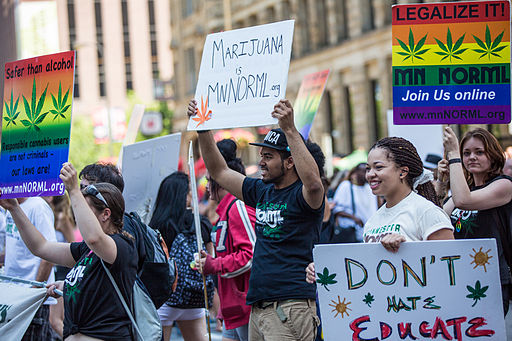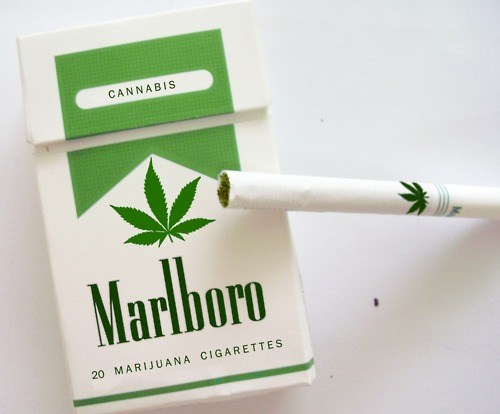I’m sitting in my car at the gas station getting my gas pumped.
A great benefit of living in Oregon is that you aren’t allowed to pump your own gas. Looking at the window of the actual station and noticing shelf after shelf filled with packs of cigarettes, I started thinking. There is literally every single kind imaginable, for every kind of smoking need you might have.
All of them packaged all pretty and sold like highly taxed and regulated candy.
There were days when people grew their own tobacco. Or maybe the local farmer grew it for them. Maybe it was smoked casually. Habitually. Ceremonially. Most likely it was cultivated on a smaller scale- planted, harvested, dried and packaged by the farmer.
It was pure in form, sans any fillers. It was like any other crop that the community wanted and needed that the farmer could provide.
And then I started thinking about cannabis, and the future of it in legal states.
* * *
I haven’t written about cannabis for obvious reasons. I can’t bear to be boxed into a stereotypical stoner, because I am not. I am also a mother—and people don’t love middle-aged mothers talking about marijuana use because people just might think you are always high while mothering or smoking around your kids and decide to call social services on you.
Mostly I haven’t written about it because until recently, it’s been mostly illegal…and now, at least in Cascadia, it’s mostly legal.
On “4.20,” I decided I should sit down and write something about it as a past resident of Washington and a current resident of Oregon, both states where cannabis growing and use is legal.
Toxicity and Mainstreaming
I am not anti-legalization. I celebrate the freedom legalizing cannabis brings and the stigma about the plant that hopefully will get lifted.
My vision is that we break through the ridiculous stereotypes and all of us that understand its benefits come a bit clean and also step into a bit of activism around it. It’s a plant, and a powerful one. People should have safe and healthy access to it if needed or wanted.
Plants should not be illegal.
Plants are plants. Some just make you feel a little “different” if you smoke them. Some are strong medicine. Some are a good time. Some stop you from coughing. Some look pretty in pots. And some taste amazing marinated in soy sauce and thrown on the grill. We have every right as people on this earth to have access to what grows from the ground.
But I have concerns. I am worried about who will have access to buying cannabis, what kind of forms it’s offered in and who will be allowed to grow and sell it. I am worried about the growing practices and production methods as well as the style of distribution. I am concerned about pesticide use—like that in our food, our tobacco and our alcohol spirits.
Will cannabis eventually be filled with a bunch of toxic fillers sold to the masses in a form that is unrecognizable to its true and pure state by companies with far and wide reaches such as major tobacco companies?
I don’t know. But it’s possible.
In Washington state medicinal growers are not regulated by the government. The Strangers shared an article a few weeks ago that revealed the biggest violators of pesticides in marijuana are medicinal growers. When you purchase marijuana as a medicine in Washington state you may very well be getting large amounts of pesticides in the product.
How is that medicine?
Since legalization, cannabis farmers who have been growing for a long time are not making money in the way you’d hope a pot farmer would…because when you grow cannabis, unlike any other crop, you receive no tax breaks. What this means is that successful cannabis farmers could very well be people who are farming other things already—on a large scale—and are all set up to take on a new cash crop.
This puts cannabis at risk of becoming a crop no different than wheat. Or tobacco. Or soybeans.
I just can’t stomach thinking about that.
Branding
The Bob Marley family just launched Marley Naturals in partnership with Seattle big cannabis spenders Privateer Holdings, so by the end of this year there will be a global brand of cannabis coming from the tuff gong’s legacy. According to Rita Marley, Marley Naturals will be “Jamaican strains that Bob enjoyed.” They are branding it as a healing plant, much to what Rastafarians have always believed and named and sing endlessly about: “it’s the healing of the nation.”
Willy Nelson also has branded a strain of cannabis called Willie’s Reserve. Willie Nelson’s is a mostly sativa cannabis strain that will leave users clear-headed, allowing them to perform artistic or social activities.
Both of these brands claim integrity with the pure state of the plant. These will be pre-rolled marijuana cigarettes. And after hours of research, I couldn’t find information on the actual growers, the cultivators, or the manufacturers of these brands. I couldn’t find out the exact methods or process. I want to know everything about what I purchase and consume, including who is growing it, especially when it’s branded in a way that is aligned with the teachings of Rastafarianism.
Mainstreaming and branding marijuana can go two ways. High end cannabis from all over the world can be available for people who understand its uses and quality and it will make it easier to find quality cannabis with a brand you can trust—because it’s insisted upon. Because the consumers will demand it and the producers will supply it. Or a bunch of kids will start going around smoking pre-rolled cigarettes like candy, all excitedly listening to an Exodus album in their cars. And depending on the testing and integrity of the growers, they could be smoking poison instead of medicine.
The demand could be from people who know nothing and care nothing about growing methods, and only that they can now buy their weed all rolled up for them stamped with superstar approval. I am wondering who else will come out with brands.
It’s obvious Privateer Holdings is going bigger and bigger with funding cannabis endeavors.
If you check out their site they really do hold down a massive cannabis fort of technology and information—extremely medical, sterile and professional-looking in their own brand. But how big and who are they contracting to grow and what are they using? And what does this mean for the small farmer who finally can make a living at what they have loved to grow best and prospered with? Bottom line is: most herb farmers will get pushed out of the game and large agri-farmers could take over business.
Mass production will occur and men in suits will rule the game.
Again. Same story. Played over.
* * *
Our culture creates addiction very consciously. Because when we are addicted we spend money on it. Addictions make people rich. Long gone are the days when the tobacco came from the earth into the pipe. Or the spirit came from the left over apples from the orchard. And the cacao leaf was chewed straight from the tree.
But for the masses these things get watered down, processed and become toxic chemical-infused substances, made poorly and cheaply, far away from their original form and origin, so far away from their purpose.
Cannabis is not physically addictive, but with added ingredients, it can easily become that way.
And why wouldn’t it if people are counting on making a ton of money from it? It almost makes sense that it needs to become addictive for profit. We can say, “of course it will be regulated!” But we all know what happened to tobacco. I’m not saying pure tobacco isn’t good for you. But in extreme moderation I am not sure how deadly it truly is. It’s the addiction to it, habitually smoking it daily, and all the highly toxic chemicals added that makes it 100 percent deadly.
It’s not the tobacco, it’s how we produce it, sell it, market it and use it.
Have you heard of Wax? Me neither. Wax is also cannabis, but it’s hit with a rush of butane—yes what lighter fluid is made from—in its pure form it’s glycol. It then alchemizes the plant into a very powerful wax-like substance that is so high in THC you can literally trip out.
This is also legal and quite easily available at dispensaries.
Shatter is similar but even more processed and potent. Shatter is a refined version of Wax, and involves multiple steps to extract all the plant matter and solvents. These steps usually involve a pressure vacuum. Shatter is semi-transparent, usually with a yellow or amber color. It is a thin cake, which ‘shatters’ when you break a piece off, hence the name. Shatter is extremely potent, and can be upwards of 90 percent THC.
90 percent could literally toxify your body and you could OD on it if you don’t know when to stop. This is also legal. Cannabis products created with glycol… that are being called medicinal. I have a good friend, who will remain anonymous, who told me: That stuff is even way too strong for me and I have been smoking cannabis daily for 25 years!
Another name for both of these is DABS, which is essentially a high grade hash (again made with butane) that can be smoked through a vape pen and is pretty huge with the younger generations. It’s the future of marijuana because of course the kids don’t want to smoke it the way their parents do. There is an entire DAB Girls Culture–young hot girls who share video posts of themselves on social media taking huge hits, bragging about how much they can take in. Like pin-up girls smoking honey colored pot amidst their cloud of smoke.
If that’s the culture, then fine, but the chances that your DABS are contaminated, made with hardware store butane instead of lab grade glycol, is more than likely—whether it’s bought on the street or in a medicinal dispensary.
And then, of course, you have probably exceeded a safe does of THC.
Cannabis is a Plant
But here is the thing with it being a plant. With dirt. And sun. And some paying attention, you can grow your own cannabis, in your own house, and if you are in the Cascadia area, you can do it in your own home totally legally. This is the one way you can be sure you are getting what you want.
Learn about the plant. Get some seeds. Plant them. Take care of it. Figure out what works. And use that. Or continue to support your small cannabis farmers from the underground on out. Don’t get caught up in the corporate/government hoopla around cannabis unless you are absolutely sure you are getting a pure version of what you seek. Make sure you are getting high quality, pure, toxin-free marijuana. Please.
We have to keep this conversation open and honest, we have to talk to the next generation of cannabis smokers in open and honest ways. We are the adults in the moment of legalization. All of this will affect our kids. The more we talk about it the less likely we are to accept tainted products being sold to the future generation risking another abused road for yet another natural and organic substance, a plant that helps many people—in health, happiness and spiritual life.
Cannabis is never going to be the same again.
The legalization of the plant is happening, and it’s going to be a tricky situation all around—with state laws passing but federal laws still in opposition.
But if we hold it with consciousness and keep the conversation going, we can monitor the mass production, the contamination of addictive chemicals, and prevent federal intervention. We can stop the idea that smoking cannabis is anything like smoking cigarettes in this culture. We can also remember a plant that was once burned down en masse by the government is now making the government a shit ton of money.
A plant that is considered sacred around the world is becoming a dream commodity for big business in the USA. If you care, you can be part of how this happens by paying attention and being an informed consumer for your community.
Do you use cannabis in any way? Are you in a legal state? I am not inviting you to share it with the world, but I am inviting you to pay attention to what’s happening around you and keep the conversation open and honest in your community.
Whether or not you use cannabis, talk about it. For us. For our kids. For all the kids. For the earth. For the people. For the plants.
Raise your voice. This is how we keep things real.
~
Relephant Reads:
Is Cannabis Really Harmless?
The beginning of the end of the War on Drugs: Feds legalize Pot?!
~
Author: Marybeth Bonfiglio
Editor: Renee PIcard
Image: Wiki Commons


 Share on bsky
Share on bsky






Read 2 comments and reply